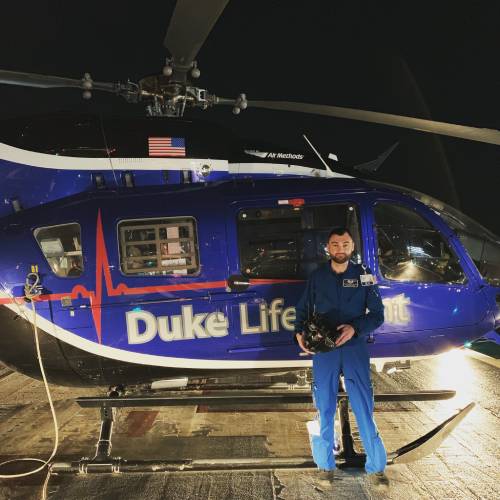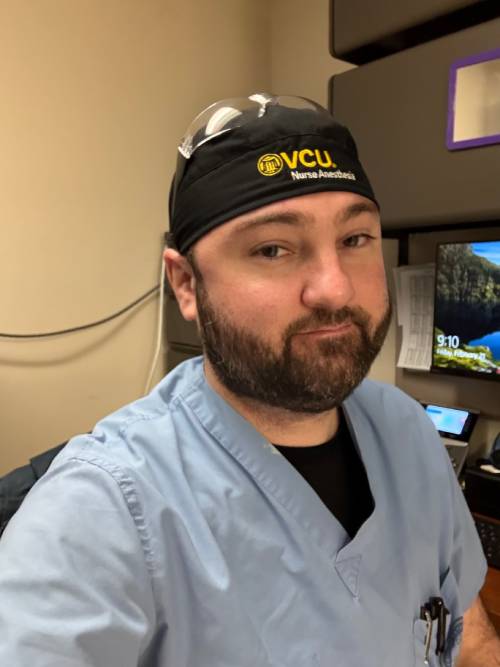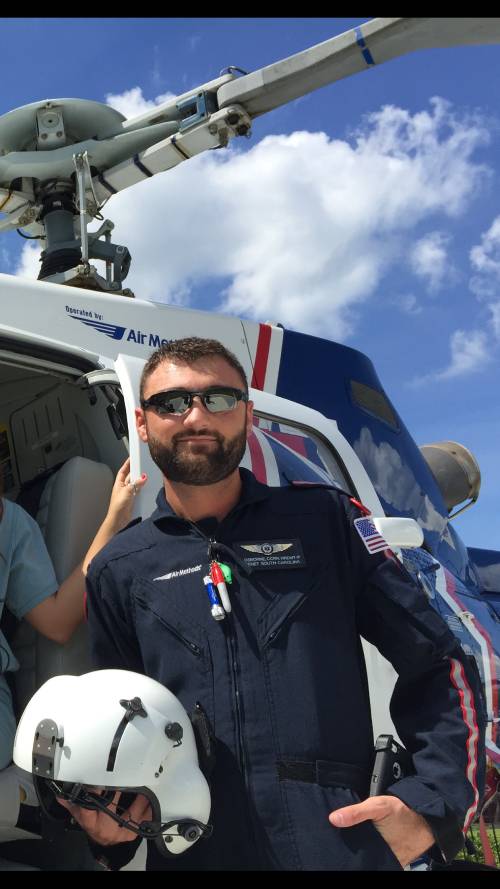Russell County native’s travel nursing journey brings him home to study nurse anesthesia
 Joseph Osborne adds new meaning to the idea of a traveling nurse.
Joseph Osborne adds new meaning to the idea of a traveling nurse.
After graduating from Southwest Virginia Community College in 2008, he practiced in emergency departments and intensive care units in Tennessee, North Carolina, South Carolina and as far away as California. Then he took to the air and excelled as a nurse aboard helicopters and planes with Duke Health’s Life Flight team for six years.
"I'm a first-generation college student and first-generation college graduate," Osborne said. "Nursing started for me because of the availability here locally. I was able to get my associate's degree in two years, and that allowed me to begin working as a nurse."
Now, in pursuit of becoming a certified registered nurse anesthetist (CRNA), Osborne has returned to – of all places – his Southwest Virginia home.
"There's a comfort in going through something challenging when you're like, ‘This is home,’" he said. "I grew up here. I know the hospitals and what the area is like."
Specialized education close to home
 Osborne is in his third and final year of the Nurse Anesthesia Program at VCU’s Abingdon distance site, part of the College of Health Professions. The program allows him to train in a rural setting while receiving the same rigorous education as students in Richmond.
Osborne is in his third and final year of the Nurse Anesthesia Program at VCU’s Abingdon distance site, part of the College of Health Professions. The program allows him to train in a rural setting while receiving the same rigorous education as students in Richmond.
With a demanding academic schedule that mirrors real-world practice, he balances coursework with intensive clinical training.
“I’m in the operating room four days a week, and I still have additional coursework,” Osborne said. "On Mondays, I’m in the OR from 6 a.m. to 3 p.m., then on Zoom for class from 6 to 8 p.m. It’s certainly busy and time-consuming, but it’s worth it."
His rotations cover a range of specialties, from obstetrics and cardiothoracic surgery to pediatrics, while also providing essential experience in rural hospitals.
"It’s beneficial to have a rural clinical site," Osborne said. "But I also get those necessary complex cases. That’s another benefit to Abingdon – I gain rural experience while also working with specialized cases."
VCU extends its full Nurse Anesthesia curriculum beyond Richmond with distance sites in Alexandria, Roanoke and Abingdon. The same high-quality education is delivered through videoconferencing, web-based lessons and in-person faculty instruction, not to mention high-tech simulation labs at each site.
“Our first distance education site was in Abingdon, and that region is largely medically underserved,” said Beverly George-Gay, DNP, CRNA, associate professor and director of distance education for the Department of Nurse Anesthesia. “We started this as a rural health outreach, and that mission continues to drive us today.”
Strengthening rural health care
By training Doctor of Nurse Anesthesia Practice (DNAP) students where they’re needed most, VCU is addressing regional health care shortages.
“We are educating excellent critical care nurses to be anesthesia providers, and keeping them local is what’s really important to us,” George-Gay said. “No one should have to drive an hour just to deliver a baby or have a minor surgical procedure.”
Abingdon became VCU’s first distance site in 2004, followed by Roanoke in 2009 and Alexandria in 2012, expanding opportunities for students to train in their home communities. The impact is clear: 80% of graduates stay and practice locally, filling essential workforce gaps.
That investment in Southwest Virginia grew with the recent addition of Crystal Hunnicutt, DNAP, CRNA, as director of Southwest Operations. A graduate of VCU’s first Abingdon cohort, Hunnicutt now supports students, strengthens clinical partnerships and expands the program’s reach.
“We are training anesthesia providers who will deliver the best possible care in rural areas,” George-Gay said. “And those who stay – or return – are helping transform health care access in their own communities.”
A program that opens doors
 For Osborne, the program provides a pathway to delivering anesthesia care in his hometown, even if his career takes him elsewhere. Returning wasn’t just about geography; it was a strategic decision.
For Osborne, the program provides a pathway to delivering anesthesia care in his hometown, even if his career takes him elsewhere. Returning wasn’t just about geography; it was a strategic decision.
“I knew it would be important to have a strong support system for something as rigorous as anesthesia school,” Osborne said. “Having the Abingdon campus was a huge help because I could return home, attend locally and have my family’s support.”
He also sees the program’s broader impact. By allowing students to train where they have roots, it strengthens the local health care workforce and makes staying a viable option.
“I grew up here, and many of my classmates have too,” Osborne said. “They’ll be able to practice in rural Virginia if that’s where they choose to build their careers.”